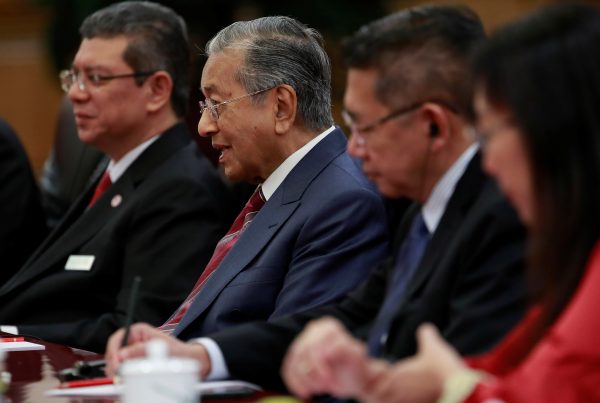In opposition, Mahathir was unabashed in criticising major Belt and Road projects for favouring Chinese interests and lining the pockets of corrupt Barisan Nasional politicians. In government, he promptly placed US$35 billion worth of rail, port and pipeline projects on indefinite hiatus, citing unaffordability under prevailing budgetary conditions.
Doubts over Malaysia’s Belt and Road participation gained momentum as the Malaysian government tightened its purse-strings and progressed reforms to heighten transparency and standards of government procurement. Meanwhile, Malaysia’s overall relationship with its largest trading partner and investor appeared increasingly clouded by sharpening rhetoric around the South China Sea, a ban on residential visas for Forest City investors (two-thirds of whom are Chinese) and a more diverse Malaysian leadership threatened by rising unrest among the ethnic Malay majority.
Yet those exaggerating the influence of such flashpoints are missing the forest for the trees. China led a surge in foreign direct investment (FDI) into Malaysia in the second half of 2018, with a fourfold annual increase in approved Chinese investment contributing to a 48 per cent jump in economy-wide FDI. The shelving of ‘unaffordable’ headline projects masks a quiet doubling in the number of approved projects, with each project investing around 500 million ringgit (US$122 million) on average. If Malaysia is truly applying the handbrake to Chinese investment and China retaliating against prominent project cancellations, both sides appear to have missed the memo.
Herein lies the folly of believing that Mahathir’s unapologetic patriotism and biting critiques of global power politics represent his day-to-day approach to international statecraft, or in believing that China would apply a heavy-handed response that risks alienating an important link on its Maritime Silk Road. Malaysia’s participation sets an important example to other Southeast Asian countries, and China’s sensitive handling of a revised engagement compact — exemplified by the recently revived East Coast Rail Link deal — demonstrates its commitment to mutually-beneficial regional development. Malaysia recognises the necessity of accepting Chinese investment, though untethered growth risks politically unpalatable perceptions of foreign subjugation and a marginalisation of ethnic Malay interests.
Bilateral relations cannot be abstracted from the broader context of the US–China trade war and the contest reshaping the global order. A Mahathir-led Malaysia has never shirked from calling out the self-interested and bullying behaviour of major powers while advancing regional forums that give greater voice to smaller nations.
With much to lose as a heavily trade-exposed economy, Malaysia has been relatively outspoken against the US–China trade war and rising protectionism. While reluctant to take sides, it has been particularly critical of the ‘unpredictable’ United States. An increasingly difficult United States coupled with a cooperative China has seen Malaysian government sentiment shift in Beijing’s favour despite the aforementioned challenges.
Within the historical context, present bilateral frictions almost seem trivial. Malaysia–China relations have withstood challenges over many decades and are set on the sturdy foundations of peace, non-interference and mutually beneficial development. History, geography and demography will continue to have a stabilising influence on relations, albeit placing natural limitations on the pace at which the relationship deepens.
Malaysia’s large ethnic Chinese minority — a legacy of Chinese labour’s contribution to colonial development on the Malay Peninsula — has been the central target of divisive ethnic politics that have plagued nation-building efforts since independence. The consequence has been a reluctance to harness the competitive advantage of ethnic networks in building trade, investment and people exchanges when tapping into China’s rapid growth.
The South China Sea also looms large as an area of contention as China presses its claims with an aggressiveness that betrays its broader conciliatory approach. Malaysia under Mahathir firmly believes in a South China Sea that is open for all nations and not dominated by an individual power, with China no longer able to rely on Malaysian acquiescence. Resisting the temptation to diverge from the historical course would also be in China’s interests. Both countries have benefitted tremendously from a peaceful and stable regional order enabling trade and investment acceleration.
There has been a subtle, positive shift in Malaysian commentary on the state of Sino–Malaysian relations in the past month or so. Serious divisions over the South China Sea have moderated, fears about Chinese empire building and security threats have been downplayed, and appreciation surrounds China’s agreement to a renegotiated East Coast Rail Link partnership. The normally outspoken Muslim-majority country has bitten its lip over China’s treatment of Xinjiang Muslims, even while expressing outrage over atrocities against the Rohingya and Palestinians.
As the first leader to confirm his attendance at the second Belt and Road summit to be held later in April, Mahathir further signalled Malaysia’s desire to work constructively with China. Relations between Malaysia and China can be expected to tighten as their interests converge in promoting a rules-based international order amenable to a rising Asia, peaceful and prosperous regional development and non-interference in national affairs. Behind the sensationalist headlines, the pragmatic leadership of two elder statesmen is quietly charting a balanced and stable course for bilateral relations.
Stewart Nixon is a Research Scholar in the Crawford School of Public Policy, The Australian National University.

